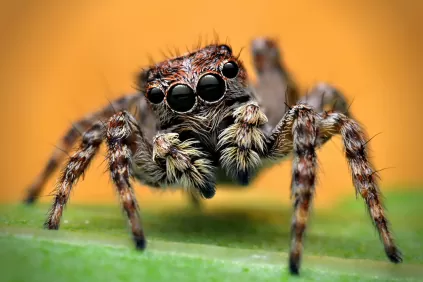The declaration:
The New York Declaration on Animal Consciousness
Which animals have the capacity for conscious experience? While much uncertainty remains, some points of wide agreement have emerged.
First, there is strong scientific support for attributions of conscious experience to other mammals and to birds.
Second, the empirical evidence indicates at least a realistic possibility of conscious experience in all vertebrates (including reptiles, amphibians, and fishes) and many invertebrates (including, at minimum, cephalopod mollusks, decapod crustaceans, and insects).
Third, when there is a realistic possibility of conscious experience in an animal, it is irresponsible to ignore that possibility in decisions affecting that animal. We should consider welfare risks and use the evidence to inform our responses to these risks.
fucking finally.
The definition of sentience is really low, it’s basically the ability to have sensations and react. The most basic organisms can be argued to have that. The definition is not what I used for most of my life, which is higher intelligence.
That technically is the definition of sentience, basically consciousness with the ability to react and have awareness of your surroundings. I think the word your looking for is sapience, which is the ability to contemplate and act productively using knowledge and reasoning
I think jumping spiders fit into the sapience category then. They’re known to learn different prey types and change their hunting strategies accordingly, even learning typical behaviour and being able to pick out sick/injured insects and figuring out they don’t need to go full stealth.
They’ve even been observed to enter REM like dreaming states, where it’s assumed they process a lot of the visual information they picked up throughout the day.
So basically every animal higher than the jumping spider might fit into the sapience category, which is kinda wild to think about
Jumping spiders also seem to be genuinely curious about things. Anytime I want to take a photo of one, it stops, looks at the camera, jumps on it to check it out, and then leaves. Kinda like I’d take a look at a new product on display on a supermarket shelf
Oh great, even more reason for me to be terrified of spiders
Jumping spiders are little dears, all of them are harmless to people and don’t spin webs. Very polite guys
Naw you’re fine. If you give it a chance you can even learn to find them cute.
Reeeeaaaaally doubt it
Look at it, it’s cuts as hell. (I’ll hide it behind a spoiler tag. A phobia is a phobia, after all)
spoiler

Well that’s the word we should use when discussing animal intelligence then.
It is. We say sapience when discussing intelligence, and sentience when discussing consciousness.
Yeah, the word they’re looking for is Sapient. Which is pretty surprising considering it’s their word.
Higher intelligence is sapience. Whereas sentience means having a perspective and being aware.
E: oops someone beat me to it
sentience
noun- The quality or state of being sentient; consciousness.
- Feeling as distinguished from perception or thought.
3.The quality or state of being sentient; esp., the quality or state of having sensation.
I think it is irresponsible wether these creatures are sentient or not. We never know when we’ll cut enough threads to make an ecosystem come undone.
So a child isn’t sentient in your opinion? I’ve always understood sentience as the ability to have experiences, memories, and emotion (which is different from the paper’s definition, that was my layman definition).
Everything about this society is irresponsible, haven’t you noticed? “tee hee can’t stop me” is more or less the name of the game and it’s dragged everybody down to its level
“Responsibility”, “empathy” and “ethics” must never be allowed to stand in the way of profit, religion or old people not having to change.
There is no question in my mind that one hundred years from now we will look back at our treatment of animals in the same way we look back upon slavery.
That would be nice, wouldn’t it? I am less optimistic, given the way the world is going. It it would be nice.
Your reminder to go vegan if you’re not already :)
I go vegan for a few months every time I watch earthlings, then I remember how to compartmentalize.
lmao cope
Who’s downvoting this?
innocent plants
This is the best summary I could come up with:
The declaration was published Friday at an event at New York University, where scientists engaged in active and at times heated debate about the state of the science on animal consciousness, and the wisdom of releasing such a statement at all.
The problem of considering animal consciousness is that it “immediately brings us into contact with serious imaginative limitations,” signatory Jonathan Birch, a philosopher at the London School of Economics, told attendees.
All scientists, he said, ”are familiar with articles that summarize research that people do not trust — because they feel they are cherry-picking the data, they are relying on studies that are not objective.”
He added that while the signatories themselves disagreed on the dimensions of animal consciousness and its ethical implications, they agreed “big steps have been taken in the last 10 years,” and that these needed to be part of the conversation.
Per a summary of the recent research in Quanta Magazine, “we now know, for example, that octopuses feel pain and cuttlefish remember details of specific past events … and that zebra fish show signs of curiosity.”
In the insect world, Quanta noted that “bees show apparent play behavior, while Drosophila fruit flies have distinct sleep patterns influenced by their social environment.
The original article contains 824 words, the summary contains 196 words. Saved 76%. I’m a bot and I’m open source!
My stylist just got seven baby chicks and was startled that they seemed to be developing distinct personalities. “I thought chickens were, ya know, just chickens”.
I used to have 3 cockatiels and each one was like a toddler with its own distinct personality.











